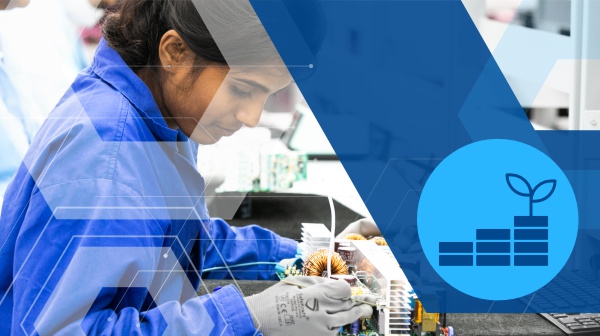A word from the CEO
Year 2021 was a year of strong growth for Incap. Despite the difficult circumstances, our revenue grew almost 60%, supported with the capacity expansions at our Indian factories and high market activity. The growing need for electronics is driven by, for instance, the growth of sustainable energy solutions, electric vehicles and charging infrastructure. I am happy to note that, as a result of the positive development and the increased market value, Incap is now a mid-cap company. I am also very proud of all our over 2,500 employees – we are now about 600 more than a year ago.
In 2021, our corporate responsibility work focused very much on the well-being of our personnel. We put a lot of effort in protecting our employees from the effects of the coronavirus for instance by arranging info sessions about the benefits of the vaccinations as well as enabling and offering vaccinations.
Our aim is to keep and attract the best professionals by providing good training opportunities. In addition to offering training for our employees, we also arranged training for the interns in all our factories. We also supported the youth in our local communities by participating in various ways, such as supporting schools with computer labs and co-operating with local universities and colleges. We also participate actively in policy making for the industry and development of relevant educational programs.
Our Corporate Responsibility Programme with key themes was introduced in 2020. As a part of the programme, we launched a Code of Conduct for all Incap employees and our major suppliers, and in 2021, we rolled out a Code of Conduct training for all our employees.
This report is our second one, and it shares key results of our programme and what Incap stands for. Our approach in social, environmental, and economic responsibility is to continuously improve our performance and share the results with our stakeholders.
Staying true to our values and focusing on our key themes will help us reach our strategic targets. Through our work, we also support the United Nations Sustainable Development Goals, of which we are now a signatory.
I am proud of our achievements in 2021. Together with all Incap’s employees, we stay committed to sustainable development.

Corporate Responsibility report
As the basis for our Corporate Responsibility program, we conducted an anonymous online stakeholder survey during October-November 2020. The main stakeholders for the survey were selected based on the level and nature of their expectations towards us and their importance to our business. We received 331 responses to the targeted online questionnaire which was sent to our customers, suppliers, investors and to Incap’s employees and management.
The aim of the survey was to find out what are the most important Corporate Responsibility themes and essential areas of development from different stakeholders’ point of view. As a result of our Stakeholder Survey and further management analysis, we arrived at defining the material Corporate Responsibility themes, related GRI topics, KPIs and the UN Sustainable Development Goals that Incap contributes to.
Incap’s Corporate Responsibility program
♦ Ethical practices, fair treatment and equal opportunities
♦ Health, safety and well-being of employees
♦ Training and development opportunities and family friendliness
♦ Supporting local societies
♦ GRI 401: Employment
♦ GRI 403: Occupational Health and Safety
♦ GRI 405: Diversity and Equal Opportunity
♦ GRI 406: Non-discrimination
♦ Workers covered by certified OHS management system
♦ Number of work-related injuries
♦ Number of discrimination incidents
♦ New employees hires, employee turnover
♦ Ratio of salary of women to men
♦ Training days per employee
♦ Zero injuries
![]()
♦ Waste and hazardous material management
♦ Energy efficiency and CO2 emissions
♦ GRI 302 : Energy
♦ GRI 306 : Waste
♦ GRI 307: Environmental compliance
♦ Amount of waste
♦ Recycling rate
♦ Number of environmental non-compliance cases
♦ Energy consumption
♦ Energy intensity
![]()
♦ A growing business partner
♦ Anti-competitive behaviour and anti-corruption
♦ GRI 201: Economic performance
♦ GRI 205: Anti-corruption
♦ GRI 206: Anti-competitive behaviour
♦ Revenue growth, profitability, earnings per share
♦ Operating costs, employee costs, taxes
♦ Number of incidents of corruption or anti-competitive behaviour
![]()









